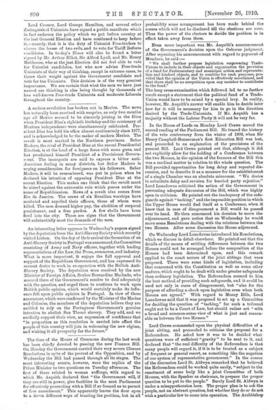On Wednesday Lord Lansdowne introduced his Resolutions, which we discuss
in detail elsewhere. He pointed out that the details of the means of settling differences between the two Houses could not be arranged before the composition of the Houses had been determined upon, and this remark applied to the exact nature of the joint sittings that were proposed. There were some kinds of legislation, including that concerned with the Constitution as well as some other matters, which ought to be dealt with under greater safeguards than ordinary legislation. The Referendum seemed to him the best method of providing such safeguards, and it could be used not only in cases of °disagreement, but "also for the purpose of affording a check upon legislation even when both Houses are agreed." With regard to Money Bills, Lord Lansdowne said that it was proposed to set up a Committee for deciding the question of "tacking," for such a tribunal ought not to be a Court of Law, but should rather act "with a broad and common-sense view of what is just and reason- able as between the two Houses."


















































 Previous page
Previous page